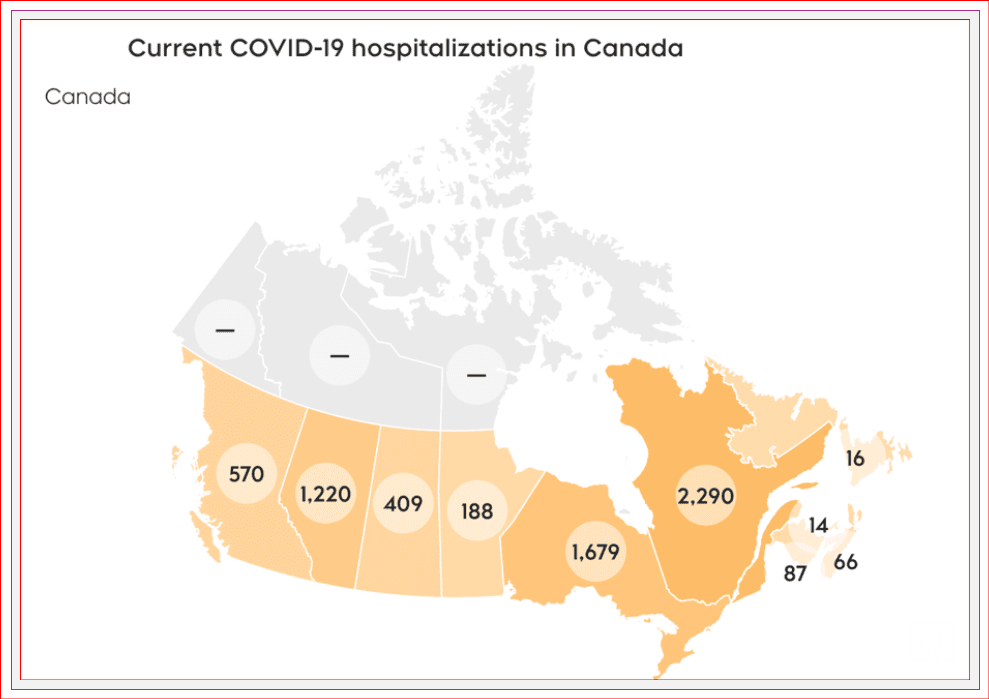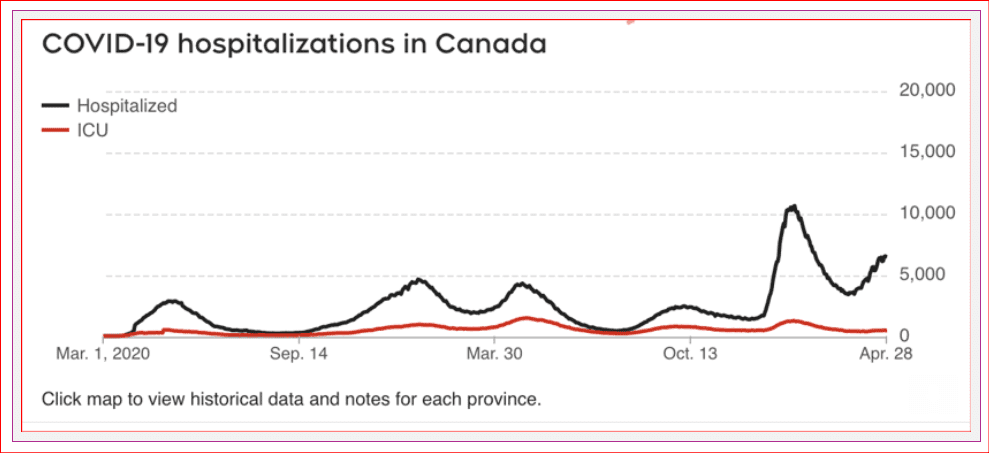Hello friends,
I hope you had a wonderful weekend!
The “lovely spring weather” brought many runners to the Toronto Marathon yesterday. Running the 42.2 km was draining but exciting. The event was cancelled last year due to the pandemic, and while COVID is still very much around, it was amazing to share this event with so many hard-core athletes.
Suffice to say; I am not walking much today. If you see me this week, you’ll know why I am limping.
The sixth wave is rumbling along. Hospitalizations are still going up, particularly in Ontario, Quebec and Alberta.


Most common questions of the week
Are unvaccinated people more likely to infect others with COVID-19?
A new Canadian study shows that unvaccinated people are more likely to infect people around them, even if their contacts are vaccinated. Conversely, unvaccinated people are less likely to get COVID if they are around vaccinated, people.
Do we know anything more about Long-COVID?
As I reviewed last week, we are only beginning to know much about long-COVID. Many people develop it, and I have many patients experiencing symptoms weeks and months after infection.
A new study from the United Kingdom, published in the prestigious journal, The Lancet, shows that less than 1/3 of adults hospitalized with COVID felt fully recovered a year later. Females and obese individuals are affected disproportionately. This means that for those who are infected and hospitalized, most of them are now experiencing symptoms of long COVID.
What is new with COVID-19 vaccines for kids?
Last week Pfizer applied with the FDA seeking emergency use authorization for their COVID booster for kids aged 5-11. Their phase 2/3 trial showed that kids who received a booster were better protected against the original COVID virus and the Omicron variant.
Last week, Moderna submitted applications to the FDA and Health Canada for authorization of its vaccine for kids aged six months to 5 years. The Moderna vaccine is approved for use in kids six years and older.
They propose 25 microgram doses, ¼ the dose given to adults and ½ the size used for kids 6-11. They recommend two doses, four weeks apart.
Moderna’s trial for 6-month to 6-year-old children was during Omicron, and the vaccine was less effective at preventing COVID than in previous trials of adults. Both vaccines were less effective against infection in adults during the Omicron wave, but they both remain very effective at preventing severe illness, hospitalization and death.
Moderna says their vaccine for young children is 51% effective at preventing symptoms in kids six months to 2 years and 37% effective against symptoms in kids aged 2 to 5 years.
Have most people had COVID recently?
The CDC estimates that 58% of US adults have antibodies to COVID-19, meaning they have been infected with COVID from February 2022 or more recently. This is up from 34% in December 2021. This is based on blood samples across the United States. The study suggests that 75% of US kids were infected by COVID in recent months.
What is Remdesivir?
Remdesivir, a medication made by Gilead Sciences, called Veklury, is a COVID treatment. It was approved last week by the FDA as a treatment for kids 28 days and older. This is the first COVID treatment for kids younger than 12 to be approved in the US. It can be used in kids with mild to moderate COVID-19 who are at high risk of progression to severe disease and those already hospitalized with COVID-19.
What do we know about the mysterious liver failure affecting kids?
Ontario’s Chief Medical Officer of Health, Dr. Kieran Moore, released a memo to notify clinicians and public health that there have been cases of severe acute hepatitis of unknown origin in more than 170 kids in the United States, Israel and Europe.
These patients:
- test negative for hepatitis viruses (A, B, C, D and E)
- have high liver enzymes on blood testing.
- have no other explanations for their illness.
- sometimes have abdominal pain, diarrhea, or vomiting.
- rarely have a fever.
- sometimes require liver transplantation.
One death has been reported in this group.
We are unsure of the trigger, though adenovirus has been identified in some cases. Adenovirus usually causes mild cold symptoms like running nose, pink eye and cough and is not associated with hepatitis.
Some of these kids have had confirmed COVID-19 infections, but most do not have active COVID.
As many of these children are younger than 5, they have not received a COVID vaccine, and the vaccine has been ruled out as a cause of this illness. Some people think this may be a manifestation of long-COVID, which could present 4-6 weeks after COVID-19 illness.
Overall, information regarding the etiology of these cases is evolving, although adenovirus has been identified in some cases. No other epidemiological risk factors have been identified to date.
What does acute hepatitis look like?
New onset of the following:
- Jaundice (yellow discoloration of the eyes and skin).
- Darker urine and pale stools.
- Some children have abdominal pain, vomiting or diarrhea.
- Others have itchy skin, fever, aches and pains, lethargy or loss of appetite.
Importantly, the last two bullet points are also common symptoms of COVID and other flu-like illnesses. We don’t want anyone to panic. It is best to chat with your healthcare provider if your child is well, particularly if they have jaundice.
Blood work can determine if a child has acute hepatitis.
What is the current mask mandate in high-risk settings?
Ontario masking requirements have been extended until June 11 for higher-risk indoor settings, including doctors’ offices, hospitals, long-term care facilities and retirement homes.
All patients and family members three years and older must be masked while inside Kidcrew.
My silver lining of the week
My history as a long-distance runner is a strange one. I was a cyclist for decades and hated running. On vacation in 2019, my husband, a long-time runner, encouraged me to run on the beach with him. Begrudgingly, I did, and I fell in love (again!). I became obsessed with it. I began training for a marathon, which I ran in October 2019, a mere ten months after my first run on the beach.
The run was terrible, and I had significant right leg pain throughout. I assumed it was my thigh tendinitis acting up. Surely many marathoners have leg pain when running for so many hours, right?
Afterwards, I couldn’t walk, go upstairs, or even crawl. I was a mess.
It turned out I had a stress fracture in my right hip. All that pounding on the pavement caused some significant damage.
In December 2019, I had a titanium rod put into my right femur. I wasn’t allowed to run farther than 10 km for a year.
I slowly worked back up my mileage (yes, I am still obsessed!) and ran a few half marathons last summer. I did a 30 km race too. But the pandemic led to the cancellation of the marathons in Toronto last year.
I am so thankful for my talented surgeon, encouraging kids, and incredible husband for supporting my vision to run this beast again. This time, with more thoughtful training and no pre-existing ‘tendinitis.’
If you have a goal, however lofty, go for it. You will feel so amazing that you did. Even in my case, if you break a leg trying 🙂
Have a wonderful week, everyone.

Dina is a wife, mother of 4, and adrenaline junky. She loves to share children’s health information from her professional and personal experience. More About Dr Dina.



![[Dr. Dina News] IMPORTANT UPDATE re. VIRTUAL CARE](https://drdina.ca/wp-content/uploads/2021/01/dr-dina-kulik-kids-and-virtual-care-1a-400x250.jpg)
![[Dr. Dina News] COVID-19 Vaccine for Infants and Young Children.](https://drdina.ca/wp-content/uploads/2021/04/dr-dina-kulik-kids-and-vaccines-400x250.jpg)
![[Dr. Dina News] COVID-19 Vaccine for Infants and Young Children.](https://drdina.ca/wp-content/uploads/2022/04/DRD-1-400x250.jpg)






